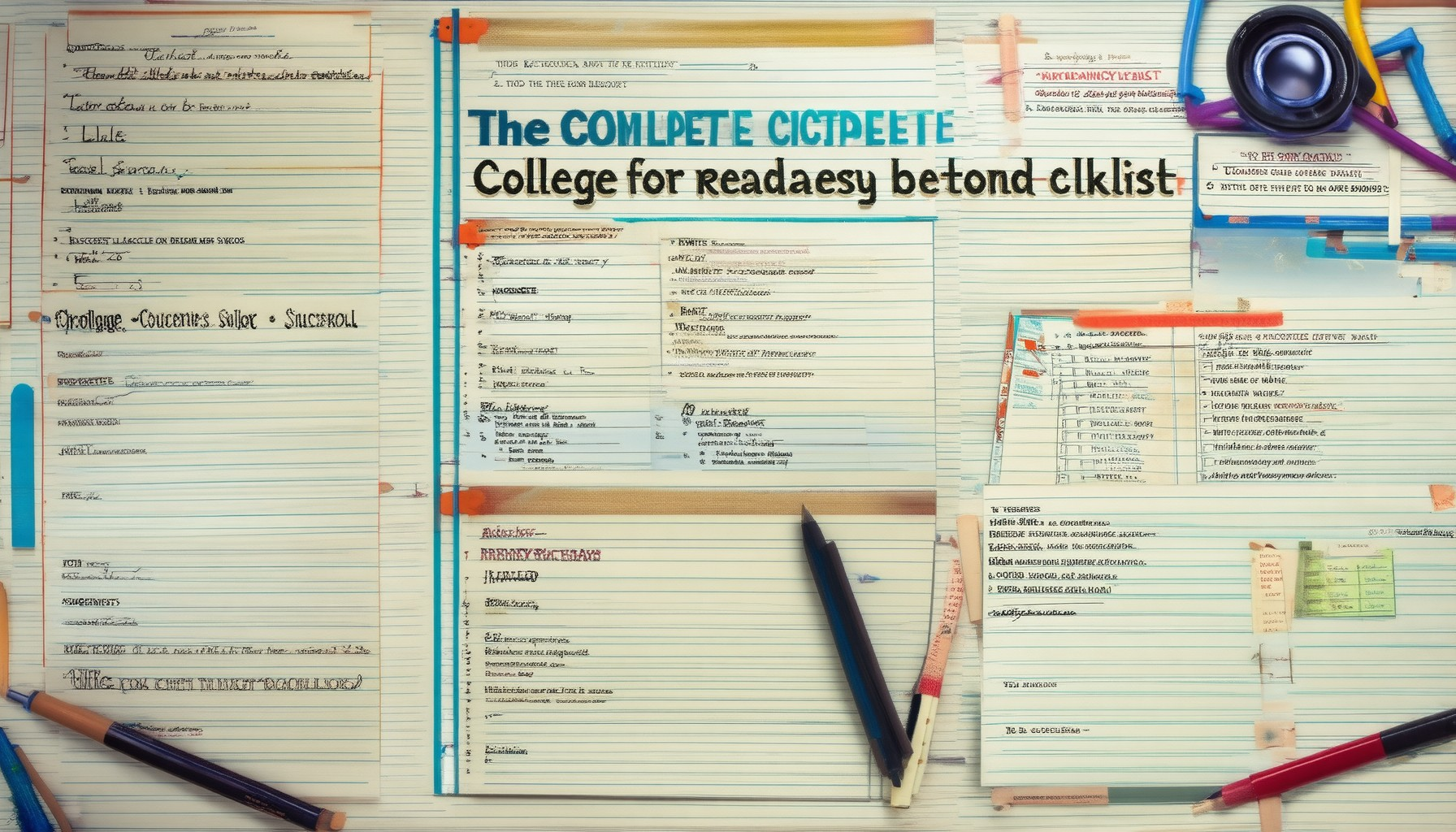Preparing for the transition from high school to college is a pivotal moment in anyone’s educational journey, marked by a mix of excitement and anxiety. As you embark on this new chapter, it’s essential to approach it with careful planning and organization. A well-crafted college readiness checklist can serve as your roadmap, ensuring you cover all bases and feel fully prepared for what lies ahead. Whether it’s understanding the essentials of college life, mastering time management, or securing your financial future, having a structured plan can make the difference between thriving and struggling during your college years. This guide will walk you through the key aspects of college readiness, offering insights and practical advice to help you navigate this significant milestone with confidence and ease.
Key Takeaways
- Build a Robust Academic Foundation: Strengthen core subjects and prepare for standardized tests like SAT and ACT.
- Engage in Diverse Extracurricular Activities: Develop leadership, creativity, and empathy through clubs and volunteer work.
- Secure Financial Readiness: Apply for scholarships, save strategically, and explore part-time job opportunities.
- Excel in Time Management: Use organizational tools and prioritize tasks to balance academics, work, and social life.
- Enhance Core Skills: Review algebra, geometry, and essay writing, and experiment with effective study techniques.
- Foster Lifelong Learning: Pursue hobbies and explore new experiences to broaden your perspective and discover talents.
- Strengthen Networking Connections: Seek mentorship and engage with peers and professionals to build a support system.
- Ace the College Application Process: Research colleges, visit campuses, and apply strategically with a clear plan.
- Cultivate a Growth Mindset: Embrace challenges, view failures as opportunities, and build confidence through self-assessment.
What to Put on a College Checklist
- Financial Preparation
- Budgeting and Savings Plan
- Understanding Tuition and Fees
- Exploring Scholarships and Financial Aid Options
- Academic Planning
- Course Registration and Requirements
- Understanding Major and Minor Requirements
- Setting Up Academic Advising Meetings
- Health and Wellness
- Health Insurance and Medical Services
- Mental Health Resources and Counseling Services
- Physical Fitness and Exercise Routine
- Time Management
- Scheduling Classes and Assignments
- Creating a Study Schedule
- Managing Deadlines and Priorities
- Social and Professional Development
- Joining Student Clubs and Organizations
- Building Social Networks
- Attending Career Fairs and Workshops
- Technology Setup
- Setting Up Email Accounts
- Downloading Necessary Software
- Ensuring Internet Connectivity
- Living Situation Preparation
- Understanding Housing Options
- Meal Plan Considerations
- Preparing for Off-Campus Living
- Legal and Safety Considerations
- Understanding College Policies
- Registering for Emergency Contacts
- Knowing Local Laws and Regulations
- Networking and Career Planning
- Attending New Student Orientations
- Registering for Classes Early
- Exploring Internship and Job Opportunities
- Fun and Relaxation
- Staying Connected with Family and Friends
- Exploring Recreational Activities
- Maintaining a Healthy Work-Life Balance
What Are the Three Most Important Components of College Readiness?
The journey to college success involves several critical components that work together to ensure students are fully prepared for the challenges ahead. Below, we outline the three primary elements of college readiness:
- College Awareness
Understanding what college entails and its significance is the foundation of readiness. Students need to grasp the requirements, such as completing high school, meeting grade-point averages, and passing standardized tests like the SAT or ACT. Additionally, exploring potential majors and career paths helps students align their goals with their aspirations. By understanding the college application process, including deadlines and prerequisites, students can stay organized and motivated. - College Eligibility
Ensuring that students meet the academic and demographic criteria for admission is crucial. This includes maintaining a certain GPA, excelling on standardized tests, and demonstrating leadership through extracurricular activities. Financial eligibility is also a significant factor, as many students rely on scholarships, grants, or loans to afford tuition. Familiarizing oneself with financial aid options, such as the Free Application for Federal Student Aid (FAFSA), is essential for long-term success. - College Preparedness
Beyond academics, students must develop life skills that extend beyond the classroom. Time management, independent learning, and adaptability are key competencies that translate well into college. Building strong communication skills, both written and verbal, enhances interactions with professors and peers. Additionally, gaining hands-on experience through internships or volunteer work provides valuable insight into professional environments, helping students make informed career decisions.
By focusing on these three components—college awareness, eligibility, and preparedness—students can navigate the complexities of college life with confidence and ease. Enroll Maven offers valuable resources to guide students through each stage of their educational journey, ensuring they are well-prepared for the road ahead. Explore our platform to discover tips, advice, and tools tailored to support academic success and enrollment guidance.
What 10 Steps Do You Need to Take to Get to College?
Here’s a step-by-step guide to help you navigate the journey to college:
- Start Early : Begin researching colleges and universities during your high school years to explore your options.
Learn more about planning your college path . - Assess Your Goals : Identify what you want to study and what career path you aim to pursue. This will help you choose the right institution.
Explore career guidance resources . - Research Colleges : Visit campuses, read reviews, and compare programs to find the best fit for your needs.
Discover college reviews and ratings . - Prepare for Tests : If required, study for standardized tests like the SAT or ACT. Practice using official practice materials.
Find test preparation resources . - Apply to Colleges : Gather necessary documents like transcripts and recommendation letters. Complete applications before deadlines.
Learn about the college application process . - Seek Financial Aid : Apply for scholarships, grants, and federal aid to reduce tuition costs. Start early to secure funding.
Explore financial aid options . - Visit Campuses : Schedule campus tours to get a better feel for the college environment and meet future classmates.
Plan your campus visit . - Make Informed Decisions : Compare offers from different colleges based on location, cost, program quality, and student support services.
Use comparison tools . - Enroll and Confirm : Once accepted, complete enrollment paperwork and pay fees. Confirm housing arrangements if applicable.
Understand the enrollment process . - Prepare for Success : Set up your living arrangements, join student organizations, and stay connected with your advisors for support.
Transition to college life .
What Should I Study to Get Ready for College?
To prepare effectively for college, it’s essential to approach your studies holistically, covering a range of areas that will support your academic and personal growth. Here’s a structured plan to guide you:
1. Academic Preparation
- Core Subjects:** Strengthen your foundation in mathematics, science, and English. These are often critical for various college majors.
- Electives:** Explore subjects that align with your interests, whether they’re art, design, engineering, or business.
- Advanced Courses:** Consider enrolling in Advanced Placement (AP) or International Baccalaureate (IB) courses if they fit your academic goals and strengths.
- Standardized Tests:** Prepare thoroughly for SAT and ACT. Use practice tests and study guides to gauge your readiness and identify weak areas.
2. Extracurricular Activities
- Leadership Roles:** Continue involvement in teams like debate or soccer to develop teamwork and leadership skills.
- Volunteer Work:** Engage in community service, such as volunteering at shelters or food banks, to build empathy and responsibility.
- Creativity:** Join clubs like art or drama to foster creativity and self-expression.
3. Financial Planning
- Scholarships and Grants:** Research and apply for financial aid options. Many require demonstrated financial need and academic merit.
- Funding Strategies:** Set aside savings monthly and explore part-time job opportunities to contribute to your college expenses.
4. Time Management
- Organizational Tools:** Use planners or digital tools to manage your schedule effectively, balancing study, work, and social life.
- Priority Setting:** Learn to prioritize tasks based on deadlines and importance to avoid feeling overwhelmed.
5. Skill Development
- Basic Skills:** Review algebra, geometry, and essay writing to ensure a solid foundation.
- Study Techniques:** Experiment with study methods like spaced repetition and teaching others to enhance retention.
6. Lifelong Learning
- Hobbies and Interests:** Cultivate passions like reading, coding, or public speaking to broaden your perspective and meet new people.
- Exploration:** Try new experiences to discover hidden talents and interests that may shape your college journey.
7. Networking
- Mentorship:** Seek advice from supportive teachers and mentors who can offer guidance and insights.
- Community Engagement:** Connect with peers and professionals through school events, online forums, and alumni networks.
8. Application Process
- Research and Visit Campuses:** Investigate colleges, attend info sessions, and speak with current students to gain insights.
- Application Strategy:** Understand requirements, deadlines, and selection criteria to make informed decisions.
9. Mindset and Attitude
- Growth Mindset:** Embrace challenges and view failures as opportunities for growth.
- Confidence Building:** Practice self-assessment and seek feedback to build self-esteem and confidence.
By addressing these areas, you’ll be well-prepared for the challenges and opportunities that college presents. Stay focused, proactive, and open-minded as you navigate this exciting phase of life.
What Should Every College Freshman Know?
College is a transformative phase filled with new experiences, challenges, and opportunities. To help you thrive, here are some essential tips every college freshman should know:
-
Master Time Management
College introduces a unique balance of academics, social life, and personal responsibilities. Effective time management is key to succeeding. Use tools like planners, digital calendars, or apps like Todoist or Trello to organize your schedule. Prioritize tasks based on deadlines and importance, and allocate time for self-care to avoid burnout.
-
Build Strong Relationships
College brings you into contact with mentors, peers, and professionals who can greatly influence your journey. Get to know your professors, teaching assistants, and advisors—they often offer valuable insights and support. Building friendships with classmates can also provide academic and emotional support, while study groups can enhance learning outcomes.
-
Care for Your Mental Health
College can be stressful, but prioritizing mental health is crucial. Utilize campus resources like counseling services, wellness centers, or meditation groups. Maintain a healthy lifestyle with regular exercise, balanced nutrition, and adequate sleep. Remember, seeking help is a sign of strength, not weakness.
-
Develop Financial Literacy
Managing finances wisely is essential for college success. Create a budget, track expenses, and apply for scholarships or financial aid. Avoid unnecessary debts by comparing costs of textbooks, housing options, and meal plans. Consider part-time jobs or internships to earn extra income while gaining work experience. -
Explore Extracurricular Opportunities
Colleges offer a wide range of clubs, organizations, and activities that can enrich your experience. Join groups aligned with your interests, whether academic, cultural, or recreational. These involvements can help you build skills, make friends, and contribute to your personal growth.
-
Stay Engaged and Informed
Stay connected with your college community by attending events, meetings, and workshops. Keep abreast of campus policies, safety protocols, and academic updates through official communications. Active involvement helps you feel integrated and prepared for future challenges. -
Learn from Mistakes
College is a place to take risks, explore new ideas, and learn from missteps. Embrace failures as opportunities to grow and refine your approaches. Remember, every successful person has faced setbacks, and your resilience will shape your journey.
By understanding these key areas, you’ll be better equipped to navigate the complexities of college life and make the most of your experience.
Classes Most Colleges Look For
Colleges typically look for a well-rounded transcript that demonstrates academic rigor and intellectual curiosity. Here are the key classes and criteria they often prioritize:
- Core Academic Subjects: – English or literature – Mathematics (including algebra, geometry, calculus) – Science (biology, chemistry, physics) – History (U.S. history, world history, geography) – Foreign language (Spanish, French, Chinese)
- Labs and Research Components: – Lab-based science courses (e.g., biology lab, chemistry experiments) – Research methods courses (e.g., statistics, research design)
- Electives and Advanced Placement/International Baccalaureate (AP/IB): – AP or IB courses in subjects aligned with college majors – Relevant electives that showcase specialized knowledge or skills
These classes and experiences help colleges evaluate your readiness for undergraduate studies and your potential to succeed in their programs.









0 Comments